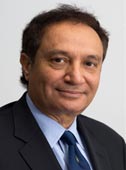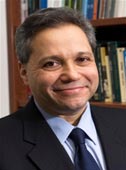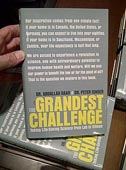BOOK REVIEW
The Grandest Challenge:
Taking Life-Saving Science from
Lab to Village by Abdallah Daar &
Peter Singer
 Abdallah Daar
|
With the world’s population now approaching 8 billion,
approximately 90% live in the poor periphery
with half the life expectancy of
the 10% who are privileged to
live in the centre of the developed
world. Abdallah Daar and
Peter Singer are bringing to the
peripheral countries the scientific
power needed to heal themselves
through translation of scientific knowledge.
Abdallah attended medical
school in Kampala, Uganda until the notorious dictator Idi
Amin ordered all Asians out of
the country. Abdallah completed
his degree at the University of
London and subsequently studied
surgery and internal medicine at
Oxford, completing a PhD in
Immunology. As a young surgeon,
he performed a double kidney
transplant from a tiny 34
week gestational age stillborn donor. This is still a world
record and the recipient is alive nearly two decades later.
|
"The 10/90 gap refers to the statistical finding of
the Global Forum for Health Research that only
10% of worldwide expenditure on health research
and development is devoted to the problems that
primarily affect the poorest 90% of the world’s
population." (http://en.wikipedia.org/wiki/10/90_
gap). Reciprocally, 90% of research funding is
devoted to problems of the most fortunate 10%.
The efforts described in this book are shifting the
proportion toward 16/84.
|
The death of his sister from inadequately treated
malaria drove home to Abdallah the lived experience of
the 10/90 gap. She was one of the million who die each
year from malaria. In 1998, he left his position as Chief
of Surgery in Oman for the new field of Global Public
Health and Ethics. Though the genome revolution was
on, the periphery was left out. "But the discovery of quinine
and the malaria patients were all in Africa".
 Peter Singer
|
He met Peter Singer while on sabbatical at the University
of Toronto Joint Centre for Bioethics. Peter had come to
realize the injustice of the 10/90 gap as his meteoric career
in bioethics was unfolding. He served as founding director
of the Joint Center for Bioethics, where international
students from Africa, India, Pakistan and South America
came to study under an NIH - Fogarty Foundation grant
aimed at promoting justice in international research ethics.
Peter was trained in internal medicine at the University of
Toronto and in public health and research methods at Yale.
He studied ethics at the University of Chicago. He developed
the unique model of the Joint Center for Bioethics
with its network of ten university
hospitals. This allowed him
to introduce bioethics from inside
the medical system. At a bioethics
meeting in Cape Town, he visited
a clinic in an African slum and
saw first hand the intensity of the
10/90 problem. "The clinic was a
small room with peeling paint and
nothing in it."
|
 The Grandest Challenge:
Taking Life Saving Science
from Lab to Village
|
When Abdallah joined Peter at
the Joint Centre they launched
a campaign to bring the innovations of the genomics
revolution to the developing world. Despite initial rejection
of their idealistic quest by the scientific community,
they published a study in Nature Genetics, ranking the
top 10 priorities to improve the health of the developing
world. Attracted to the grand challenges proposed
by Abdallah and Peter, The Gates Foundation asked
their advice on how best to address these problems. This
excellent book documents their remarkable experience.
|
"There can be no peace, no security, nothing but
ultimate disaster, when a few rich countries with
a small minority of the world’s people alone have
access to the brave, and frightening, new world of
technology, science and high material living standard,
while the large majority live in deprivation and
want, cut off from opportunities of full economic
development; but with the expectations and aspirations
aroused far beyond the hope of realizing them."
Nobel prize winner and Canadian Prime Minister Lester Pearson
|
They had used the Delphi method - "a structured
way of building consensus among a group of experts that
avoids the interpersonal dynamics of meeting." In Davos,
Switzerland, Harold Varmas, former director of the U.S.
National Institutes of Health and former director of the
Memorial Sloan -Kettering Cancer Centre, came up with the
idea of overcoming critical barriers as a model for the grand
challenges project. This new, unfamiliar and brilliantly simple
way to think about a scientific project extended the range
of the diseases that could be affected by eliminating a bottle
neck. For example, by eliminating the need for refrigeration,
needles, syringes, and repeated doses, the barriers to immunization
against many diseases could be addressed directly.
Scientists from the developing and developed world collaborated
in defining the challenges. Abdallah & Peter guided the
selection process, and Bill and Melinda Gates provided the
inspiration, determination and the initial financial support
to move the projects forward.
The compelling narrative style and in-depth accounts
of problems and strategic solutions, told from the personal
viewpoint of the authors who participated in every step,
provide a gripping story that will engage and benefit scientists
and lay readers alike. Curiously, the chapters are entitled
"Chapter 1", "Chapter 2" etc, leaving the reader uncertain
about what will happen next as the story unfolds. A fitting
climax develops when the Canadian Grand Challenges
Program is launched with funding from the Canadian
Government as part of its foreign aid budget. The program
is serving as an operating system to deploy coalitions of
international public, private and not for profit organizations
like the Gates Foundation, US NIH, the Welcome
Trust, the World Health Organization and other sponsors.
Peter serves as CEO, and Abdallah as Chief Science and
Ethics officer of the Canadian Grand Challenges Program.
Current Project of Grand Challenges Canada include
identification and funding of rising starts in Global
Health, point of care diagnostics, global mental health
and creating and strengthening health enterprises.
M.M.
|